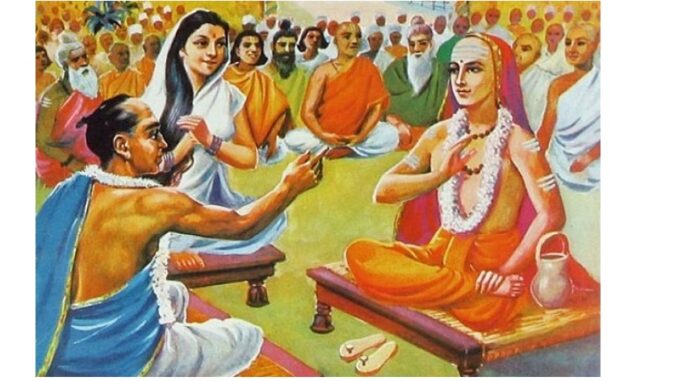
As the moon through the branches
dances and shines
and weaves and ducks
as a lion hides
slinks
uses camouflage
springs
as a cat
plays
sidles up
gives a little nip, claws,
rubs himself against me, amiably
companionably
he rolls a dice
dangles a throne
turns on the music.
Who’s the frog in the water, then,
gradually being warmed, so
it doesn’t jump out?
“Six million children in our country”, I plead,
“Aren’t taught even to write or to read”.
So let’s teach them yoga!
“Eleven million children”, I push,
“Are dead every year for reasons that are entirely avoidable”.
Let’s plant trees!
I don’t normally say boo, but today I am a loon.
“Twenty-five million children don’t get the basics: milk or rice or bread!
Its living hell”.
Let’s organise a satsang
“Thirty-one million”, I sin,
“Do you understand, Guruji, what that means?!
“Can’t find jobs”.
Ah, do stop obsessing about such things
Concerning this world, which is merely maya[1].
He has me binned.
Instead, do your pranayama[2], then shout ‘Jai Hind!’[3]
His ways are a riddle as well as a rune,
Weaving and ducking, and ducking and weaving,
Dancing and shining, as through the trees, the moon.
© Prabhu S. Guptara
[1] "Paksha" lit: "side", a paksha is the period either side of the Full Moon Day (Purnima); so, an aspect, facet or part of something; derivatively, "take the side of someone in an argument" or "to support something". The background to the poem is that, in ancient India, there was a rule, during debates, that a proponent could proceed to his next point only if he first repeated in his own words a point made by an objector, and then answered that point to the objector's satisfaction. [2] "Maya": lit: "appearance", "illusion", according to the dominant Indian philosophical tradition, Vedanta, this world is only an illusion, just as our perception that we are individuals is also an illusion. [3] “Pranayama”: the regulation of breathing through techniques and exercises that differ according to the teacher or guru from whom one learns. [4] "Jai Hind": lit. "Victory to India"; the slogan of the movement for the independence of India from British rule
********
Prabhu Guptara’s first published poem was in The Illustrated Weekly of India, in the 1960s. Since then, his work has appeared in Ars Notoria (U.K.), Blythe Spirit (U.K.), Confluence (U.K.), Desh Aur Diaspora (USA), Dissident Voice (USA), Indian PEN, Journal of Indian Writing in English, Kunapipi (Denmark/ Australia), Masala (U.K.), MuseIndia, Poetry24 (U.K.), PoetsIndia, Setu (USA) Ship of Fools (U.K.), South Asian Review of English (Malaysia), The Poets Republic (Scotland), Wasafiri (U.K.), Black Lives Matter (anthology, U.K.), The Redbeck Anthology of British Asian Poetry, and so on. Two collections of his poems were published in the 1970s by Writers Workshop, Calcutta. He edited An Anthology of Contemporary Indian Religious Poetry in English, as well as Selected Poems of Leela Dharmaraj. In January 2017, Skylark Publications, UK, chose him Poet of the Month, and he is included in Debrett’s People of Today.

Leave a Reply